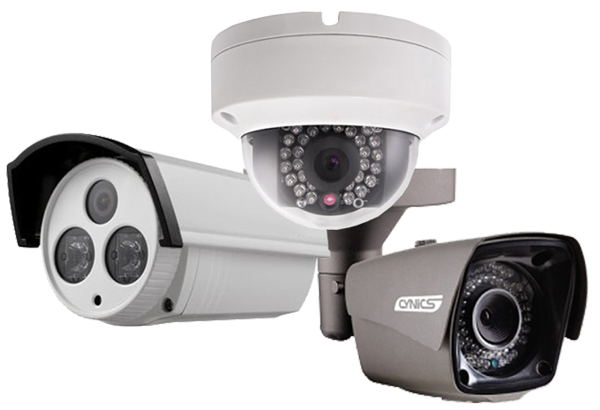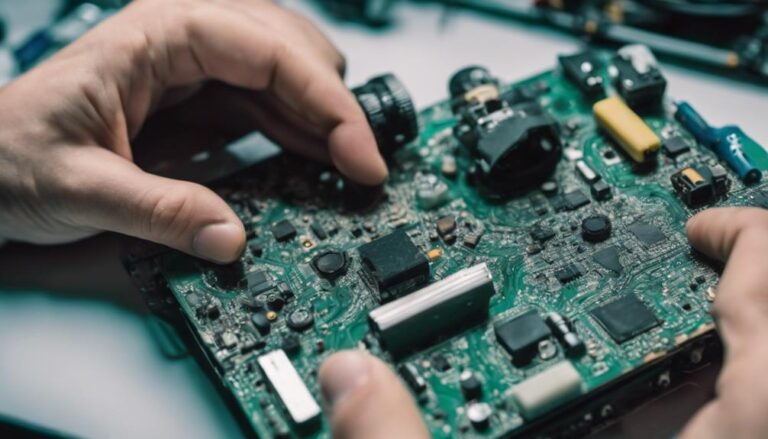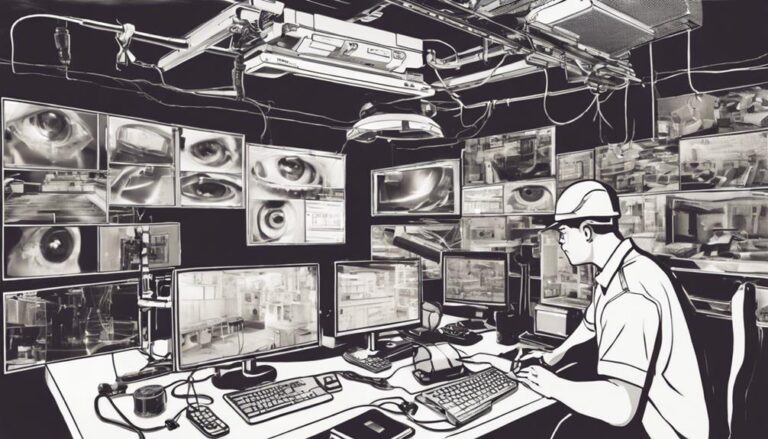When comparing IP cameras and CCTV cameras, you’ll find several important differences. IP cameras use a network for data transmission, offering high resolutions up to 4K and easy remote access. They’re simpler to install with fewer cables, leverage existing networks, and offer flexible, cloud-based storage options. CCTV cameras, on the other hand, connect via coaxial cables, typically provide lower resolution, and need extensive cabling. They store footage on DVRs and are better suited for localized setups. Though installation is more labor-intensive, CCTV systems have lower initial costs. Keep going to discover the best option for your specific needs.
Definition and Basics
An IP camera, or Internet Protocol camera, sends and receives data through a network, while a CCTV camera uses a direct connection to a recording device. If you value flexibility and remote access, IP cameras offer a world of possibilities. With an IP camera, you can tap into your system from anywhere with internet access. It’s like having eyes in the back of your head, whether you’re at home, at work, or halfway across the globe.
CCTV cameras, on the other hand, are more traditional. They send footage straight to a DVR (Digital Video Recorder) or a VCR (Video Cassette Recorder). This means you have to be on-site to access your recordings. While it might feel more straightforward, it lacks the adaptability that modern lifestyles often require.
To set up an IP camera, you’ll need a bit more tech-savviness. You configure it through a network, sometimes requiring software or apps. But once it’s up and running, you get the freedom of remote viewing and often better integration with smart home systems. CCTV cameras are usually easier to install but come with the trade-off of being more static.
Video Quality
When it comes to video quality, IP cameras generally offer higher resolution and clearer images compared to traditional CCTV cameras. If you’re looking for crisp, detailed footage, you’ll appreciate how IP cameras can capture high-definition video. This means you can easily identify faces, license plates, and other critical details that might be blurry or pixelated with CCTV.
Let’s break down the differences:
| Feature | IP Cameras | CCTV Cameras |
|---|---|---|
| Resolution | Up to 4K or higher | Typically up to 720p |
| Image Clarity | Superior, less noise | Lower, more noise |
| Digital Zoom | Clear, retains detail | Blurry, loses detail |
| Night Vision | Advanced, better quality | Basic, lower quality |
| Bandwidth Usage | Higher, but adjustable | Lower, fixed |
IP cameras also offer advanced features like digital zoom, which maintains image clarity even when zoomed in. This is important for those of you who value freedom and want to monitor every detail without compromise. Plus, IP cameras usually come with better night vision capabilities, ensuring you don’t miss anything, even in low-light conditions. While they might use more bandwidth, most modern IP cameras allow you to adjust settings to balance quality and usage, giving you more control over your surveillance system.
Installation Process
After considering video quality, let’s explore how the installation process differs between IP cameras and CCTV cameras. If you value flexibility and ease, you’ll find IP cameras appealing. They connect via your existing network, often requiring just a single Ethernet cable for both power and data, thanks to Power over Ethernet (PoE). This reduces the need for extensive cabling, making it simpler to install in various locations without drilling holes or running additional wires. Plus, you can easily expand your system by adding more cameras without major hassle.
On the other hand, CCTV cameras, or analog systems, involve a more traditional setup. You’ll need to run separate coaxial cables for video and power, which can be cumbersome and limit your placement options. The installation is typically more labor-intensive, requiring you to plan out and manage multiple cables. Additionally, you’ll have to connect these cables to a central DVR unit, which means more wires to conceal and manage.
While both systems have their merits, IP cameras offer a more streamlined and adaptable installation process. If you’re looking for a quicker, more versatile setup that doesn’t tie you down, IP cameras are the way to go.
Connectivity
IP cameras leverage your existing network infrastructure for connectivity, offering seamless integration and remote access. You can connect them to your Wi-Fi network, making it easy to place cameras wherever you want without worrying about running cables. This flexibility empowers you to monitor different areas of your property without being tied down by physical limitations.
With IP cameras, you’re not confined to a single location to view your footage. You can access live streams and recorded videos from anywhere in the world using your smartphone, tablet, or computer. This is perfect for those who crave the freedom to keep an eye on things while traveling or away from home.
On the other hand, traditional CCTV cameras rely on coaxial cables and a closed-circuit system. This setup limits where you can place cameras and often requires more complex and permanent installations. You won’t have the same level of connectivity or ease of access as you do with IP cameras.
Storage Options
Beyond connectivity, another key consideration is how each camera system handles storage options. When choosing between IP cameras and CCTV cameras, you’ll find notable differences in how video footage is stored and managed, which can directly impact your flexibility and ease of access.
IP cameras offer you a range of modern storage solutions:
- Cloud Storage: This option allows you to store footage on remote servers. You can access it from anywhere, ensuring your data is safe even if the camera is damaged or stolen.
- Network Attached Storage (NAS): With NAS, you can store large amounts of data on a local server. It’s a great middle-ground, offering both security and accessibility without relying on external services.
- Local Storage: Many IP cameras come with built-in storage options like SD cards. This is ideal for those who want a straightforward, no-fuss setup.
On the other hand, traditional CCTV systems typically use Digital Video Recorders (DVRs) for storage. While reliable, DVRs often require more maintenance and aren’t as flexible as the storage solutions IP cameras offer.
Ultimately, your choice will depend on your specific needs and how much freedom you want in accessing and managing your video footage.
Remote Access
When evaluating remote access capabilities, you’ll find distinct differences between IP cameras and traditional CCTV systems. With IP cameras, you can access live feeds from anywhere using an internet connection. This means you can monitor your property from your smartphone, tablet, or computer, giving you the confidence to stay connected no matter where you are.
Traditional CCTV systems, on the other hand, lack this flexibility. They typically require you to be on-site to view footage, which can be restrictive if you travel frequently or have multiple properties to monitor. While some modern CCTV setups offer limited remote access through additional hardware and software, they’re often not as seamless as IP cameras.
IP cameras also offer advanced features like motion detection alerts and real-time notifications sent directly to your device. This ensures you’re always informed about any unusual activity, enhancing your ability to respond quickly. By contrast, traditional CCTV systems usually require manual monitoring, which can be time-consuming and less efficient.
Cost Comparison
Evaluating the cost differences between IP cameras and traditional CCTV systems reveals significant variations that can impact your budget and overall investment. When considering which type to install, there are a few key factors that you should weigh.
- Initial Costs: IP cameras typically have a higher upfront cost compared to CCTV cameras. This includes the price of the cameras themselves as well as the necessary networking equipment. On the other hand, CCTV cameras are generally cheaper to purchase initially, making them more appealing if you’re looking to save on startup costs.
- Installation Expenses: Installing IP cameras can be more complex and, as a result, more expensive. You’ll need professional installation to ensure proper setup of the network infrastructure. CCTV systems, being more straightforward, often come with lower installation costs, and in some cases, you might even handle the setup yourself.
- Maintenance and Upgrades: IP cameras offer easier scalability and remote maintenance, which can save you money over time. CCTV systems, however, may require more frequent physical maintenance and can be more costly to upgrade.
Understanding these cost dynamics helps you make an informed decision that aligns with your financial goals and need for flexibility.
Use Cases and Applications
Many scenarios call for the use of either IP cameras or CCTV cameras, depending on the specific needs and environment. If you’re looking for flexibility and remote access, IP cameras are the way to go. They’re perfect for monitoring vacation homes, managing business security from afar, or keeping an eye on your property while you’re out exploring the world. With IP cameras, you can access live feeds from your smartphone or laptop anywhere with an internet connection.
On the other hand, CCTV cameras excel in localized, closed-loop environments. They’re ideal for places where internet access isn’t reliable or required, like small retail stores, local warehouses, or private properties. You’ll find CCTV systems straightforward and reliable, offering consistent recording without the need for internet connectivity.
For high-security areas like banks or government buildings, IP cameras offer advanced features like encryption and higher resolution, enhancing both security and surveillance quality. Meanwhile, for simpler setups like monitoring a parking lot or a small office, CCTV cameras provide effective and budget-friendly solutions.
Ultimately, your choice depends on the level of accessibility, flexibility, and security you need. Whether you’re a globetrotter or a local business owner, there’s a camera solution that fits your lifestyle and needs.
Frequently Asked Questions
How Do IP Cameras Handle Cybersecurity Threats Compared to CCTV Cameras?
Did you know 43% of cyber attacks target small businesses? With IP cameras, you’ve got encryption and firmware updates to fend off threats, unlike CCTV. Keep your freedom by staying ahead in cybersecurity.
Can IP Cameras Integrate With Smart Home Systems?
Yes, you can integrate IP cameras with smart home systems easily. They offer flexibility and control, letting you manage security through apps. Embrace the freedom to monitor your home from anywhere with a few taps.
What Are the Environmental Durability Differences Between IP and CCTV Cameras?
You’ll find that IP cameras often offer better environmental durability with advanced weatherproofing and higher ingress protection ratings. However, some CCTV cameras are built tough for harsh conditions too. Choose based on your specific environment and needs.
Are There Any Privacy Concerns Unique to IP Cameras?
Imagine a digital eye watching your every move. Yes, IP cameras have unique privacy concerns, like hacking risks and unauthorized access, potentially compromising your personal space. Stay vigilant and protect your freedom by ensuring robust security measures.
How Do IP and CCTV Cameras Perform in Low-Light Conditions?
You’ll find that low-light performance varies. Some cameras have advanced night vision with infrared capabilities, providing clear images in darkness. Others might struggle without sufficient lighting, so choose wisely based on your specific needs and freedom desires.



